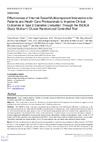Identificador persistente para citar o vincular este elemento:
https://accedacris.ulpgc.es/jspui/handle/10553/75542
| Título: | Effectiveness of internet-based multicomponent interventions for patients and health care professionals to improve clinical outcomes in type 2 diabetes evaluated through the indica study: Multiarm cluster randomized controlled trial | Autores/as: | Ramallo Fariña, Yolanda García-Bello, Miguel Angel García-Pérez, Lidia Boronat Cortés, Mauro Wägner, Ana María Rodríguez-Rodríguez, Leticia De Pablos-Velasco, Pedro Llorente Gómez de Segura, Ignacio González-Pacheco, Himar Carmona Rodríguez, Montserrat Serrano-Aguilar, Pedro |
Clasificación UNESCO: | 320104 Patología clínica 320502 Endocrinología 320610 Enfermedades de la nutrición 240208 Hábitos alimentarios 3212 Salud pública |
Palabras clave: | Behavior Modification Ehealth Patients Adherence Primary Care Type 2 Diabetes Mellitus |
Fecha de publicación: | 2020 | Publicación seriada: | JMIR mHealth and uHealth | Resumen: | Background: Type 2 diabetes mellitus (T2DM) is a chronic disease in which health outcomes are related to decision making by patients and health care professionals. Objective: This study aims to assess the effectiveness of internet-based multicomponent interventions to support decision making of all actors involved in the care of patients with T2DM in primary care. Methods: The INDICA study is an open, community-based, multicenter trial with random allocation to usual care or the intervention for patients, the intervention for health care professionals in primary care, or the combined intervention for both. In the intervention for patients, participants received an educational group program and were monitored and supported by logs, a web-based platform, and automated SMS. Those in the intervention for professionals also received an educational program, a decision support tool embedded in the electronic clinical record, and periodic feedback about patients' results. A total of 2334 people with T2DM, regardless of glycated hemoglobin (HbA1c) levels and without diabetes-related complications, were included. The primary end point was change in HbA1c level. The main analysis was performed using multilevel mixed models. Results: For the overall sample, the intervention for patients attained a significant mean reduction in HbA1c levels of 0.27 (95% CI 0.45 to 0.10) at month 3 and 0.26 (95% CI 0.44 to 0.08) at month 6 compared with usual care, which remained marginally significant at month 12. A clinically relevant reduction in HbA1c level was observed in 35.6% (191/537) of patients in the intervention for patients and 26.0% (152/586) of those in usual care at month 12 (P=.006). In the combined intervention, HbA1c reduction was significant until month 18 (181/557, 32.6% vs 140/586, 23.9%; P=.009). Considering the subgroup of patients uncontrolled at baseline, all interventions produced significant reductions in HbA1c levels across the entire study period: 0.49 (95% CI 0.70 to 0.27) for the intervention for patients, 0.35 (95% CI 0.59 to 0.14) for the intervention for professionals, and 0.35 (95% CI 0.57 to 0.13) for the combined intervention. Differences in HbA1c for the area under the curve considering the entire period were significant for the intervention for patients and the combined intervention compared with usual care (P=.03 for both). Compared with usual care, the intervention for professionals and the combined intervention had significant longer-term reductions in systolic and diastolic blood pressure. Conclusions: In uncontrolled patients, the intervention for patients at baseline provided clinically relevant and significant longer-term reductions of HbA1c levels. The intervention for professionals and combined intervention also improved the cardiovascular risk profile of patients. | URI: | https://accedacris.ulpgc.es/handle/10553/75542 | ISSN: | 2291-5222 | DOI: | 10.2196/18922 | Fuente: | JMIR mHealth and uHealth [EISSN 2291-5222], v. 8 (11), e18922, (Noviembre 2020) |
| Colección: | Artículos |
Citas SCOPUSTM
25
actualizado el 08-jun-2025
Citas de WEB OF SCIENCETM
Citations
29
actualizado el 22-feb-2026
Visitas
73
actualizado el 10-ene-2026
Descargas
72
actualizado el 10-ene-2026
Google ScholarTM
Verifica
Altmetric
Comparte
Exporta metadatos
Los elementos en ULPGC accedaCRIS están protegidos por derechos de autor con todos los derechos reservados, a menos que se indique lo contrario.
